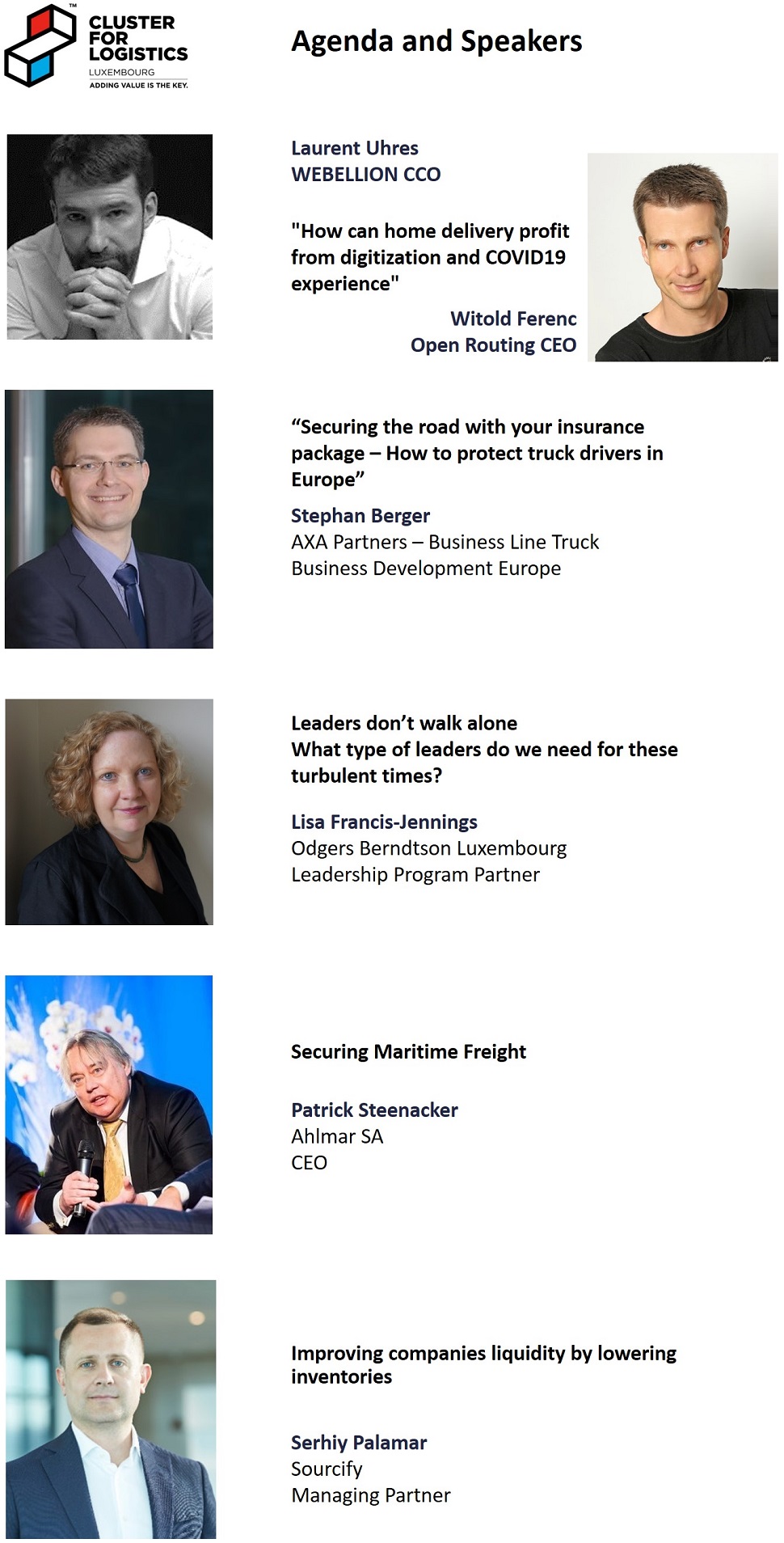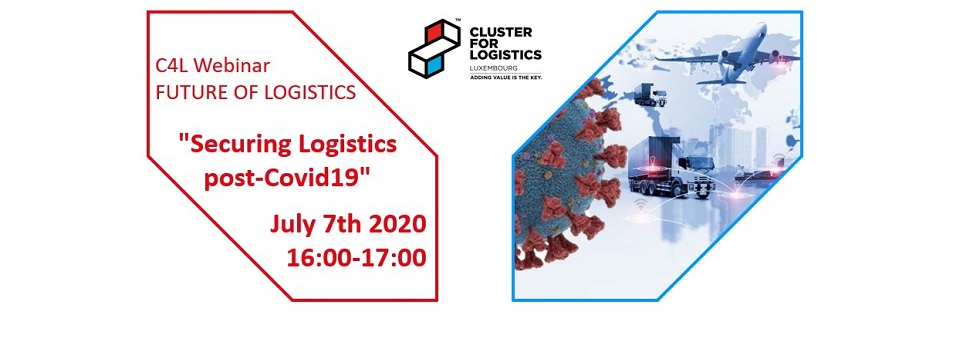WEBINAR FUTURE OF LOGISTICS: SECURING LOGISTICS POST – COVID-19
The COVID-19 crisis impacts public life and business activities since March but the logistics sector played a vital role during the lockdown by ensuring the supply of essential goods and services, including food products and other perishables, pharmaceuticals, vaccines and medical equipment. Following the gradual reopening, supply chains have to show resilience and adapt to the post COVID-19 situation.
This year’s “Future of Logistics Conference” organized by the Cluster for Logistics (C4L) on July 7th 2020 in the form of a Webinar, provided an overview from a variety of experts on best practices around home delivery, leadership training and inventory management. There is uncertainty in the sector and the Cluster for Logistics wants to share experiences from its experts, says Malik Zeniti, C4L Director.
Watch the full video below or click the links by the Speakers to watch the specific parts.
Profitability is key for e-grocers
Online shopping has experienced a real boom in the recent past as more and more customers prefer to have products delivered fresh instead of buying them themselves, explain Witold Ferenc, Founder of tech company Open-routing, and Laurent Uhres, CCO of Webellian. Aiming to supply customers as best as possible according to their wishes, Open-Routing offers an e-grocery solution allowing e-grocers to optimize allocation slots as well as route planning.
It is expected that the e-grocery business will continue to rise over the upcoming years but profitability is the main challenge of this specific sector, notes Mr Ferenc. Thus, e-grocers need to focus more on basket size rather than increasing the scale of their business. As the pandemic was boosting the demand, everyone tried to book a delivery slot. Open routing differentiates between profitable from less profitable customers and thereby adapts the selection for delivery slots.
The company participated in the Matchathon organized by C4L and EY held over a month and dedicated to home delivery.
Watch their webinar presentation
Download the Open-routing presentation
Reduce Truck downtime with TeamUP Fleet assistance
As trucks can be seen as warehouses on the road, it is important to maintain the road-based supply chain operational, says Stephan Berger, Business Development Europe at AXA Partners - Business Line Truck. This paradigm was true before COVID-19 and become even more apparent during the current pandemic. Against this background, AXA offers its new TeamUp Fleet First Assistance solution to support drivers on the road and reduce the downtime for transport companies.
AXA Partners operates a hotline service to repair or retrieve downed vehicles backed up by a European network of service providers in a short amount of time. The first assistance for heavy vehicles includes accidents and bogged down vehicles. The service also includes a strongly required support for drivers so that they are not left alone in case of any kind of accident, notes Mr Berger. This service which is offered around the clock was developed by specialized agents which count over 200.000 insured vehicles and handled more than 2 million cases.
Check out Mr Bergers webinar presentation
Download the presentation here
Leaders don’t walk alone
With so much of the world and the economy in turmoil, we have seen the pandemic draw a line between great leaders and leaders that are flawed, says Lisa Francis-Jennings, Leadership Program Partner at Odgers Berndtson Luxembourg: “It’s clear, now, that great leaders must be able to tackle wicked problems by holding the strategic in one hand and tactical in the other; understanding that it is no longer shareholder value that is driving their transformational curve, but stakeholder engagement.” But a majority of CEOs feel that their role has changed substantially and this highly impacts the way how companies locate and keep great leaders.
But what characterizes a good leader? Odgers Berndtson’s LeaderFit development model identifies 5 dimensions that are key to successful leadership in the current business climate. By focusing specifically on Stakeholder dimension and People & Team Development, Mrs Francis-Jennings explained that a well-developed stakeholder engagement is key to move things forward and that the best leaders have ambition that is textured with well-developed interpersonal skills. are comfortable to consult with their stakeholders on difficult decisions but do not feel dependent on their approval. Not all decisions can be popular but they have to be made for the organization and these leaders share the intent to do what’s best for the organization. They are actively building the best team possible, including diversity, inclusion and mentorship, and are diligent towards their responsibilities and prudent in how they spend their time: “Allowing people to prove themselves can be the highest form of praise”.
The big issue is making sure that not only the leader is the right person but the whole team aligns to achieve great results. These people already know that these leaders don’t walk alone. Even if the teams in place are working well, the LeaderFit process assesses the whole team with tested tools, notes Francis-Jennings. There is always something that can be enhanced to work more effectively together.
Lisa Francis-Jennings is available for contact for more information.
Learn more about Mrs Francis-Jennings programme
Download the presentation here
Sea Freight is preparing for the next decade
Having a good captain on board is also key in maritime trade and the sector is dealing with a lot of transformations. Patrick Steenacker, a former Captain on chemical tankers with a demonstrated history of working in the maritime industry. He went ashore in 2001 and founded maritime training centers in Belgium, France and the Republic of Congo. He is now CEO of Ahlmar SA, focused on third party management and Consultancy, and a member of the Board of the Cluster maritime Luxembourg, partner of C4L. Mr Steenacker gave a global view on the maritime business, regarding container traffic, oil bunkering and LNG use. The crisis caused a large dent into the container traffic but as customers start buying again, the major shipping companies are releasing more capacity. Europe and Middle East had however more difficulties than the US though regarding container traffic.
Regarding oil and product tankers, China is the second largest consumer after US and during the crisis they amassed 73 million barrels on 60 vessels as floating storage, three quarters of the demand of the entire planet, notes Mr Steenacker. This increases China’s influence on charter prices and can be a factor in the commercial warfare with the US. The production of iron ore and steel will rise in the next years but China is still a big demander from Brazil and Europe has to battle to get a part of transport capacity.
Ship propulsion is undergoing transformation but the pivot point to massively use LNG is not reached yet. However, the support on LNG bunkering makes it more attractive and the production is boosting in Russia. Some changes in propulsion might take 10 or 15 years to get fully implemented. The climate change is impacting sea transport as well, notably the opening of the Northern routes will change the traffic and the importance of the ports in those regions.
Listen to Mr Steenackers seafreight assessment
How to manage inventories during a production and fulfilment crisis
Before COVID-19, efficient inventory management and sourcing was relatively simple, according to Serhiy Palamar Managing Partner of the consultancy Sourcify. The current pandemic however caused two-fold effects with companies having to monitor their inventory to accommodate production loss as retailers were faced with stock depletion. Suppliers that were usually less efficient in managing stocks suddenly had too much inventory on hand, helping them to gain market shares, while very efficient companies ran out of stock and failed to fulfill consumer demand. There is no best practice to advise how to get back on the surface but Mr Palamar recommended to stay focused and to not panic and appoint a good team to look after inventory: “Accept that the crisis is not over, nor is the pandemic. Put a contingency plan in place, if you don’t have one”.
Learn more about Mr Palamars view on sourcing and inventory
Download the presentation here
With the COVID-19 pandemic continuing to have a significant impact on the logistics sector, companies face the challenge of adapting their activities, with volatility in supply and demand complicating planning for the future. In this uncertain environment, the C4L remains there to support the sector as a whole and its members in particular.











































































































































